The AMD Zen and Ryzen 7 Review: A Deep Dive on 1800X, 1700X and 1700
by Ian Cutress on March 2, 2017 9:00 AM ESTBenchmarking Performance: CPU Encoding Tests
One of the interesting elements on modern processors is encoding performance. This includes encryption/decryption, as well as video transcoding from one video format to another. In the encrypt/decrypt scenario, this remains pertinent to on-the-fly encryption of sensitive data - a process by which more modern devices are leaning to for software security. Video transcoding as a tool to adjust the quality, file size and resolution of a video file has boomed in recent years, such as providing the optimum video for devices before consumption, or for game streamers who are wanting to upload the output from their video camera in real-time. As we move into live 3D video, this task will only get more strenuous, and it turns out that the performance of certain algorithms is a function of the input/output of the content.
7-Zip
One of the freeware compression tools that offers good scaling performance between processors is 7-Zip. It runs under an open-source licence, is fast, and easy to use tool for power users. We run the benchmark mode via the command line for four loops and take the output score.
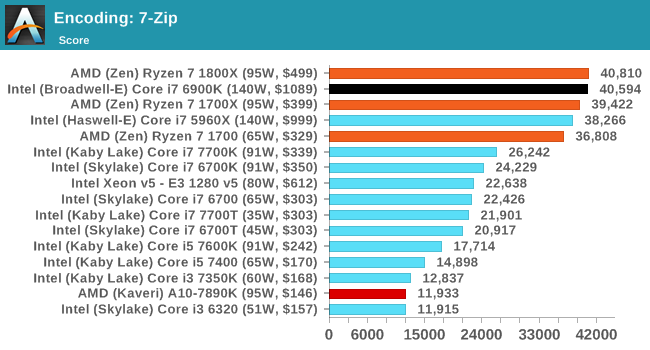
WinRAR 5.40
For the 2017 test suite, we move to the latest version of WinRAR in our compression test. WinRAR in some quarters is more user friendly that 7-Zip, hence its inclusion. Rather than use a benchmark mode as we did with 7-Zip, here we take a set of files representative of a generic stack (33 video files in 1.37 GB, 2834 smaller website files in 370 folders in 150 MB) of compressible and incompressible formats. The results shown are the time taken to encode the file. Due to DRAM caching, we run the test 10 times and take the average of the last five runs when the benchmark is in a steady state.
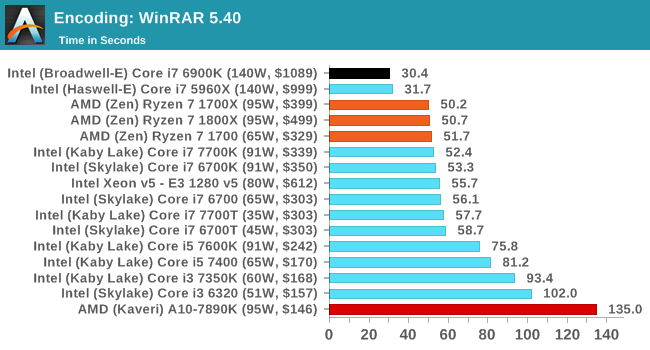
AES Encoding
Algorithms using AES coding have spread far and wide as a ubiquitous tool for encryption. Again, this is another CPU limited test, and modern CPUs have special AES pathways to accelerate their performance. We often see scaling in both frequency and cores with this benchmark. We use the latest version of TrueCrypt and run its benchmark mode over 1GB of in-DRAM data. Results shown are the GB/s average of encryption and decryption.
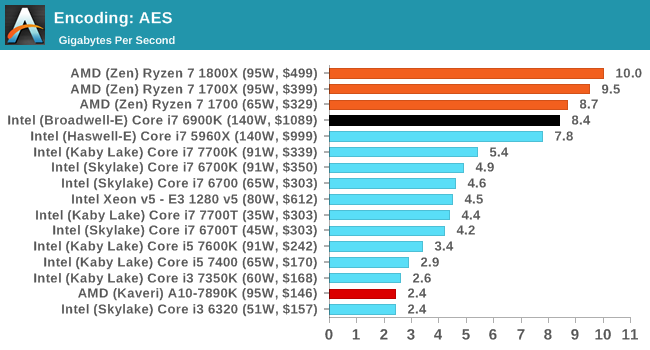
HandBrake H264 and HEVC
As mentioned above, video transcoding (both encode and decode) is a hot topic in performance metrics as more and more content is being created. First consideration is the standard in which the video is encoded, which can be lossless or lossy, trade performance for file-size, trade quality for file-size, or all of the above can increase encoding rates to help accelerate decoding rates. Alongside Google's favorite codec, VP9, there are two others that are taking hold: H264, the older codec, is practically everywhere and is designed to be optimized for 1080p video, and HEVC (or H265) that is aimed to provide the same quality as H264 but at a lower file-size (or better quality for the same size). HEVC is important as 4K is streamed over the air, meaning less bits need to be transferred for the same quality content.
Handbrake is a favored tool for transcoding, and so our test regime takes care of three areas.
Low Quality/Resolution H264: He we transcode a 640x266 H264 rip of a 2 hour film, and change the encoding from Main profile to High profile, using the very-fast preset.
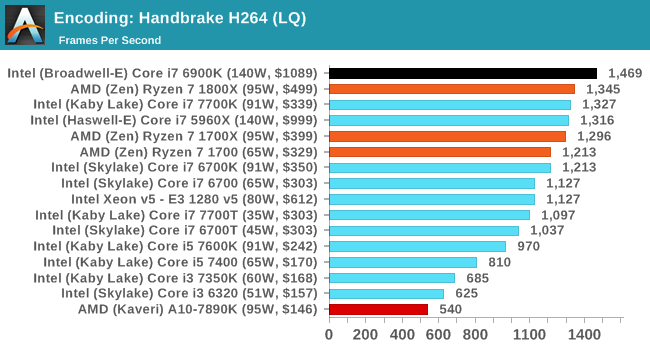
High Quality/Resolution H264: A similar test, but this time we take a ten-minute double 4K (3840x4320) file running at 60 Hz and transcode from Main to High, using the very-fast preset.
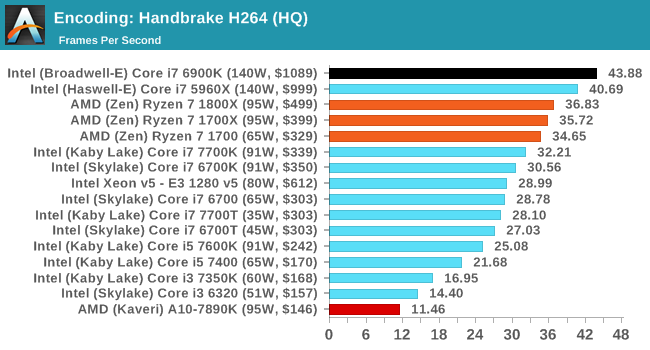
HEVC Test: Using the same video in HQ, we change the resolution and codec of the original video from 4K60 in H264 into 1080p30 HEVC. This causes a dramatic reduction in filesize.
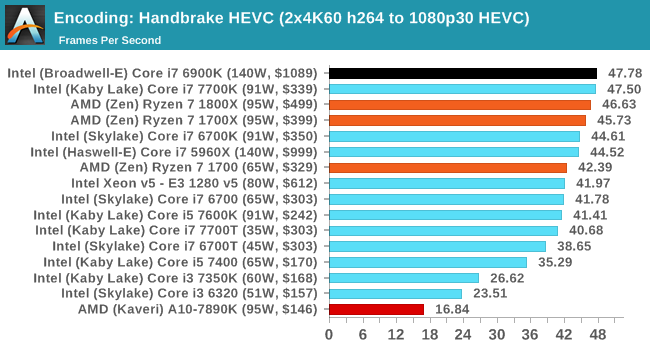










574 Comments
View All Comments
zangheiv - Thursday, March 2, 2017 - link
Hard to believe how a company like intel that repeatedly and knowingly engaged in illegal acts and other tactics to monopolize the market and cheat the consumers into high-prices, can still have dumb happy consumers after Ryzenlmcd - Thursday, March 2, 2017 - link
Some people like 256-bit vector ops I guess :-/ who would've guessed?Ratman6161 - Thursday, March 2, 2017 - link
Have to agree. To me, the i7-7700K seems like the better bargain right now. Then again, I'm looking at a $329 I7-6700K motherboard and CPU bundle and the 7700K isn't really all that much of an upgrade from the 6700K. But in the final analysis, after all this reading, I'm still not seeing anything that makes me want to rush out and replace my trusty old i7-2600K.Meteor2 - Friday, March 3, 2017 - link
+1. Maybe, as Rarson says above, a 4C/8T Zen might clock fast enough to challenge the 7700K. But in the workloads run at home, the 1800X does not challenge the (cheaper) 7700K.HPC and data centre are completely different and here Zen looks like it has real promise.
Meteor2 - Friday, March 3, 2017 - link
...Sadly the R5s are clocked equally low.https://www.google.co.uk/amp/wccftech.com/amd-ryze...
Limited by process, I guess.
Cooe - Sunday, February 28, 2021 - link
Again. You're an absolute idiot for thinking that the only "workloads done at home" are 1080p gaming & browsing the web.... You are so out of touch with the desktop PC market, it's almost unbelievable. Here's hoping you were able to aquire some common sense over the past 4 years.cmdrdredd - Saturday, March 4, 2017 - link
" I'm still not seeing anything that makes me want to rush out and replace my trusty old i7-2600K."I agree with you. I have an overclocked 3570k and I don't see anything that makes me feel like it's too old. I'm mostly gaming on my system when I use it heavily, otherwise it's just general internet putzing around
Jimster480 - Thursday, March 2, 2017 - link
Sorry but this is not the case.This is competing against Intel's HEDT line and not against the 7700k.
2011v3 offers more PCI-E lanes only if you buy the top end CPU (which ofc isn't noted in most places) a cheaper chip like the 5820k for example only offers like 24 lanes TOTAL. Meaning that in price comparison there is no actual comparison.
Ratman6161 - Thursday, March 2, 2017 - link
Well, whomever is trying to compete against, I7-7700K is about the top of the price range I am willing to spend. So Intel's 2011V3 lineup isn't in the cards for me either. AMD really isn't offering anything much for the mid range or regular desktop user either. In web browsing, office tasks, etc, their $499 CPU is often beaten by an i3. Now, the i3 is just as good as an i7-6900K too and in at least one test the i3 7350K is top of the charts. Why does this matter? Well, where does AMD go from here? If the i3 out performs the 1800x for office tasks, what will happen when they cut it to 4 cores to make a cheaper variant? Seems like they are set up for very expensive CPU's and for CPU's they have to sell for next to nothing. Where will their mid range come from?silverblue - Thursday, March 2, 2017 - link
Something tells me that if I decide to work on something complicated in Excel, that i3 isn't going to come anywhere near an R7. Besides, the 4- and 6-core variants may end up clocked higher, we don't know for sure yet.